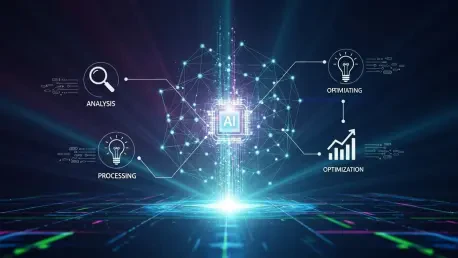In the fast-paced digital transformation era, organizations face constant pressure to optimize their operations and deliver more efficient services. AI-driven workflow automation has emerged as a revolutionary solution, promising to streamline processes and enhance productivity effortlessly. This review delves into the core aspects, features, and recent developments of AI-powered workflow automation, with a special focus on the role of machine learning and intelligent process automation.
Key Features of AI-Driven Workflow Automation
Intelligent Process Orchestration
Implementing intelligent process orchestration in workflows is drastically altering how businesses approach automation. It integrates seamlessly into the existing infrastructure, allowing tasks to be automated with an unprecedented level of accuracy and speed. This functionality is highly regarded for its ability to improve the consistency and reliability of workflows. Businesses utilizing this technology can significantly reduce manual effort, enhance compliance, and focus on more strategic activities by automating repetitive tasks efficiently.
One distinct benefit is its capacity to adapt and evolve with the needs of the business through continuous monitoring and optimization. With the ability to analyze and predict future hurdles, intelligent process automation ensures processes remain efficient and error-free. In doing so, it not only enhances organizational productivity but also fortifies decision-making processes.
Machine Learning Integration in Automation
Machine learning’s integration into workflow automation offers a substantial leap in functionality and performance. Technical aspects such as pattern recognition, data analysis, and predictive insights provide automation tools with the ability to learn from data and improve operations over time. By harnessing these machine learning capabilities, businesses can anticipate complex patterns and apply proactive measures to address potential issues before they occur.
Real-world applications of machine learning in workflow automation are widespread, ranging from customer service automation to supply chain management. This integration runs deep, allowing businesses to transform mountains of data into actionable insights. Consequently, companies are better positioned to navigate obstacles and capitalize on new opportunities, achieving scalable advantages in their markets.
Latest Developments and Emerging Trends
The landscape of AI automation is continually evolving, with recent innovations paving the way for unparalleled advancements. Recent breakthroughs include heightened AI capabilities, enabling systems to manage more complicated tasks autonomously and with minimal human intervention. Such developments indicate a shift in consumer behavior that demands quicker solutions and personalized experiences.
Emerging trends also highlight the surge in demand for digital transformation, with businesses increasingly prioritizing AI integration to ensure long-term sustainability and competitiveness. The relentless pace of innovation suggests a horizon filled with more dynamic and adaptive AI solutions, tailored to meet the ever-growing demands of various industries.
Real-World Applications and Implementations
AI-driven workflow automation is transforming diverse sectors by offering tangible benefits and efficiencies. Industries such as finance, healthcare, and manufacturing have adopted these technologies to automate tasks and processes, thereby driving value creation. Particularly in healthcare, AI facilitates meticulous patient monitoring and administration, minimizing errors and freeing healthcare professionals to focus on patient care.
In the financial sector, AI ensures efficient processing of transactions and regulatory compliance, while manufacturing benefits from enhanced supply chain efficiencies and quality control. Each sector has its unique applications, generating tailored solutions that cater specifically to their industry’s needs and challenges.
Challenges and Limitations
The journey toward fully harnessing AI-driven workflow automation is not without its hurdles. Technical challenges such as data privacy, security vulnerabilities, and integration complexities pose significant obstacles. Additionally, regulatory frameworks struggle to keep pace with rapid technological advancements, potentially stifling innovation and deployment in sensitive industries.
Deployment challenges are also compounded by market concerns around skill gaps—organizations may lack the necessary expertise needed to implement and maintain sophisticated AI systems efficiently. Despite these challenges, ongoing development efforts, including collaborations between industry experts and regulatory bodies, continue to chart the course toward overcoming these limitations and unlocking full potential.
Future Outlook and Potential Impact
The future of AI-driven workflow automation is promising and filled with opportunities for groundbreaking transformation. Advancements in AI capabilities are expected to spur further innovation, particularly regarding self-learning and autonomous systems. Over the next few years, significant breakthroughs could revolutionize the ways industries operate, reshaping business models across sectors and creating unprecedented economic growth.
The potential long-term impact extends beyond industry; societal benefits, including enhanced quality of life through smarter solutions and reduced environmental footprints, are anticipated. As organizations increasingly prioritize automation, the convergence of AI technologies promises to usher in a new wave of intelligent, interconnected systems.
Conclusion
This examination of AI-driven workflow automation reveals an innovative frontier poised to redefine industry standards. Current implementations demonstrate transformative capabilities, ensuring businesses can achieve operational excellence and competitive advantage. Although challenges persist, ongoing efforts in research and collaboration show a keen commitment to navigating these complexities. Ultimately, the future of AI-driven workflow automation holds considerable promise, offering significant enhancements and opportunities that could shape the landscape of tomorrow’s industries.









